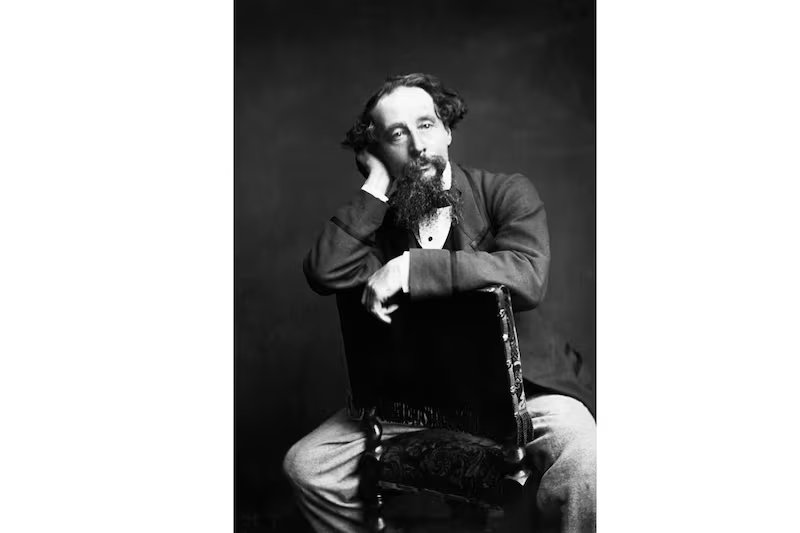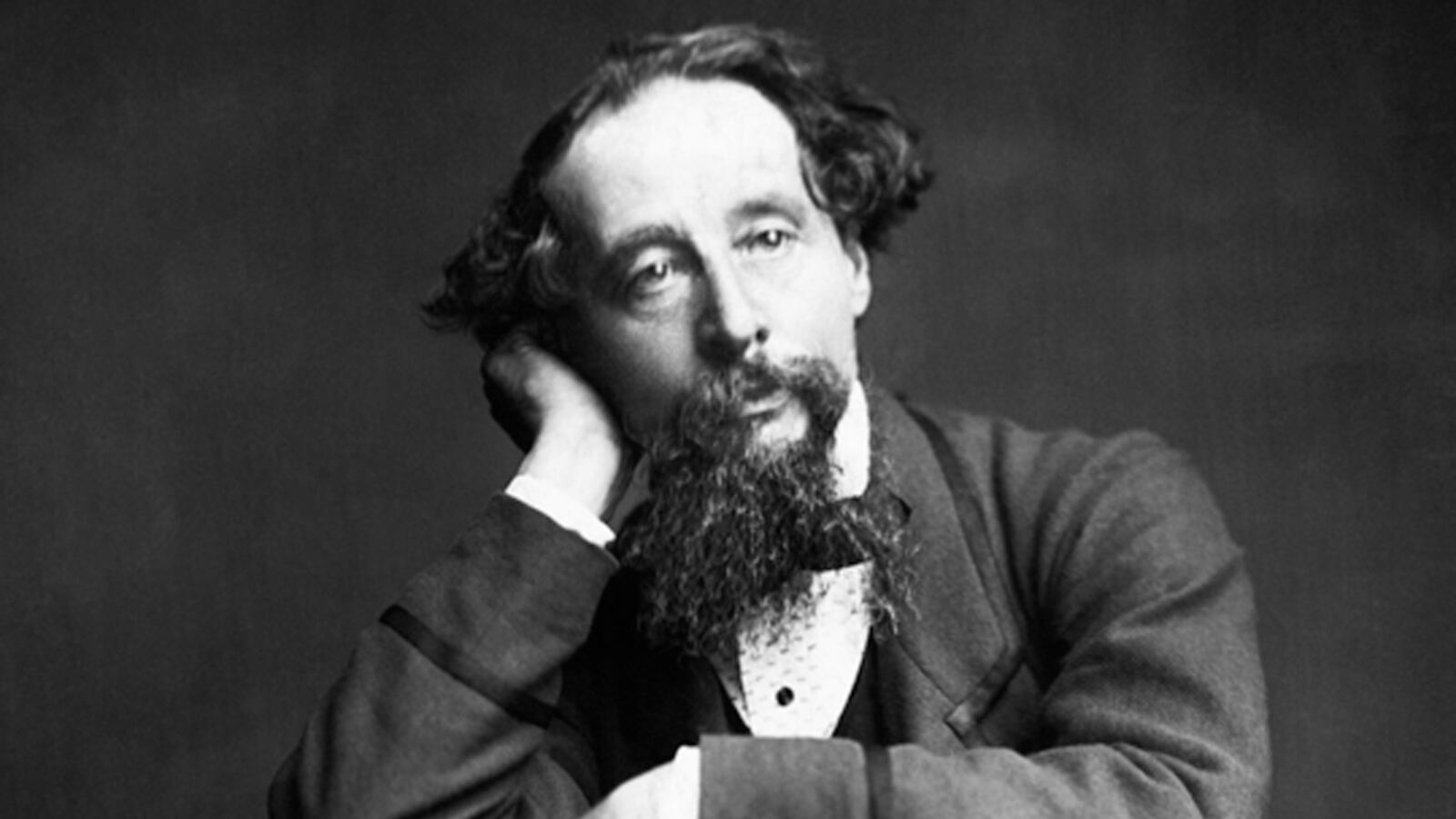His own childhood had been painful enough. At 12, and with his father imprisoned for debt, he had gone to work in factory, pasting labels onto jars of shoe polish for a few necessary shillings each week. Later he put that memory into a novel, but his own children learned only after his death that David Copperfield had been drawn from life. Still, his experience of privation had not, for the times, been in any way remarkable, and the extraordinary thing was instead his ability to recall its every detail and to get it all onto the page. The blundering big bodies of adults, the arbitrary rules and inexplicable punishments, the fear and confusion and loneliness—Charles Dickens made us understand that children were neither blank slates nor miniature grown-ups. He created our image of childhood, and if some of his characters now seem too innocent to be credible, you can find his Pip or Estella in every middle-school classroom.

Those weren’t his only creations, though, and by the time he was 30 the man who knew everything about childhood had four children of his own. A few years later he noted that he and his wife, Catherine Hogarth, had eight “at this present writing. It begins to look serious, I am afraid.” Serious indeed, and Dickens’s biographers have all looked closely at that side of his life. Nobody, however, has yet gone so deeply into his career as a father as Robert Gottlieb has in Great Expectations: The Sons and Daughters of Charles Dickens, and one of the things this finely realized new book makes clear is that childhood and individual children aren’t at all the same thing.
Dickens was the great wizard of family life, a tireless demon who seemed to work full-time at organizing private theatricals and picnics. He gave all his children nicknames—his favorite daughter, Kate, was called Lucifer Box, because her “temper would flare up” like a “lucifer” or safety match. But Dickens was also forever in a hurry. He was good with babies and his children were never afraid to interrupt him; Thomas Mann’s offspring, in contrast, trembled before the inviolable door of his study. Dickens grew distant once they reached adolescence, though, and insisted on settling the futures of his seven sons while they were still in their teens. He wanted them off his hands, wanted them to pay their own way, as he had, and complained that had “brought up the largest family ever known with the smallest disposition to do anything for themselves.”
The phrasing turns them into characters, like something out of one of his own novels, and in fact his oldest son once wrote that “the children of his brain were much more real to him at times than we were.” More real—or perhaps simply less ordinary. For Dickens’s actual children were rather ordinary. None of them had his energy or will, let alone his genius, and Gottlieb’s success lies in showing us the varying ways in which they tried to make a life in their father’s shadow. He devotes two chapters each to the Dickenses' nine surviving children (a 10th died in infancy) with the first taking them up to their father’s death in 1870, and the second pursuing them until their own. Taken as a whole, these deft miniature biographies by the former editor of The New Yorker offer a partial catalogue of the possibilities available to a prosperous and celebrated middle-class family in 19th-century England.
The oldest boy, Charley, went to Eton but then floundered before settling at thirty into the family business; not novels, but a weekly magazine called All the Year Round, of which he eventually became the editor. Most of the other boys were educated at a cheaper school across the Channel in Boulogne; good French was one of Dickens’s requirements, whatever else they might do. One son then received an army commission, and another went to the navy; a third finally became a Mountie in the Canadian west. Two more emigrated to Australia. The eldest daughter, Mamie, was a good amateur pianist, the kind of accomplishment that genteel families valued in their daughters. But she never married, drank too much, and devoted herself to her father’s memory.
The younger Kate, in contrast, turned her own schoolgirl training with a paintbrush into a career. She served as a model for John Everett Millais, and eventually married a fellow-painter; she herself concentrated on portraits of children, and her own canvases sold well. Just one of the boys knew a comparable success. Henry was the only one of Dickens’s children to go to university, and the novelist was at first wary of the expense, writing that “if he fails to set to in earnest, I shall take him away.” But Henry did set to, became a prosperous barrister, and then later a judge. He was also conspicuously happy in his marriage, and Kate thought he was the only one of her siblings who seemed “really quite sane.”
Dickens died young, at 58, worn out from overwork, from the sheer strain of being himself. Both Mamie and Henry wrote idealizing memoirs of him, but by the time of his death the novelist himself had shredded the fabric of his own domestic life. In his mid-40s the author of so many happy fireside scenes grew tired of his wife. Her family had once been more established than his own, and their marriage, when he was just 24, had given him a step up. Yet he no longer saw her as his equal. He was one of the most famous men in England, but after 10 children and a series of post-partum depressions Catherine had grown fat, tired, and dull. So at least he thought, and then he met a young actress named Ellen Ternan, a girl the same age as Kate.
He always maintained that Ellen was not his mistress, but most biographers now believe he was lying, and that they had a son who died in infancy. What’s beyond doubt is that in 1858 Dickens publicly repudiated his wife, announcing their separation in an open letter to the newspapers in which he declared that she was both an unloving and an unloved mother; “the cruelest of his slanders,” in Gottlieb’s words, “and completely unmerited.” Dickens then demanded that the children live with him, not her. Victorian fathers could do that. Mothers had few rights, and Kate wrote that “the affair brought out all that worst—all that was weakest in him. He did not care a damn what happened to any of us.” Magicians can be wonderful, but the more powerful they are the more they must be feared, and their spells, as Robert Gottlieb reminds us, can be almost impossible to break. Dickens’s children may have disappointed him, but he almost always got what he wanted, and when he died Kate joined her siblings in summoning Ellen Ternan to his deathbed.






